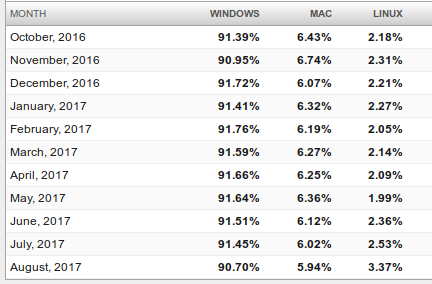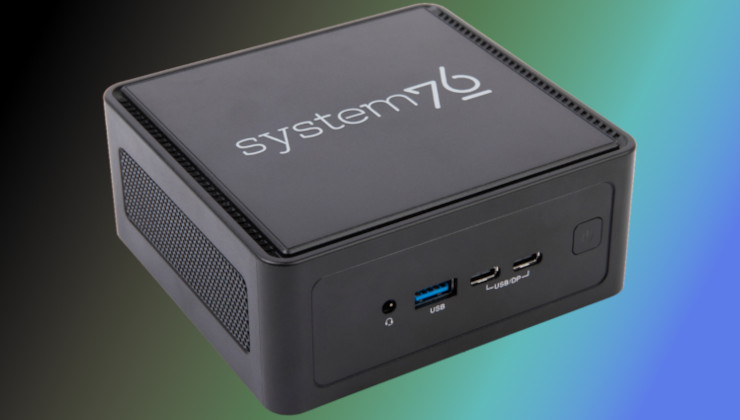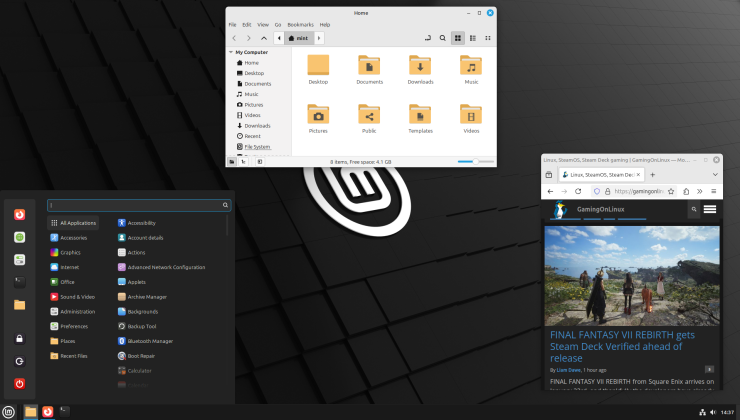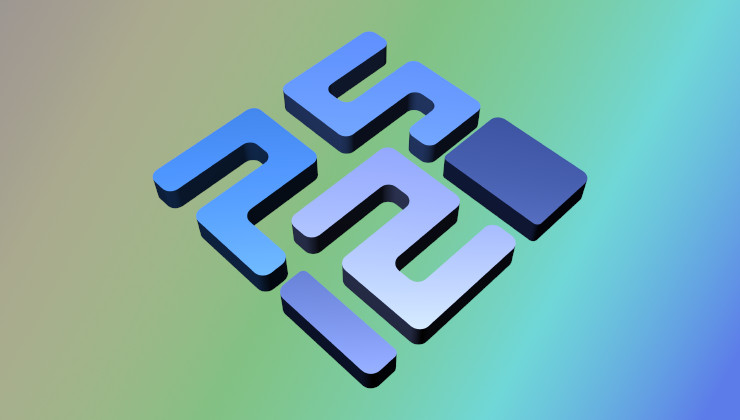Another month, another record. Linux market share has now hit 3.37% according to the netmarketshare website.
Funny, I said last time "we may hit ~3% (and hopefully stay above it) by the end of 2018.", I guess I was wrong there then?
It's worth noting that all ways of tracking it come with their own flaws. Nothing is perfect. To be honest, I don't put a massive amount of faith in them myself.
Year of the netmarketshare Linux desktop!
Some you may have missed, popular articles from the last month:
All posts need to follow our rules. For users logged in: please hit the Report Flag icon on any post that breaks the rules or contains illegal / harmful content. Guest readers can email us for any issues.
On the last survey, it only appeared when I was on steam by wine, on Linux it never asked me to complete the survey!
0 Likes
I got my second survey in linux steam. Also i had got 3rd time on windows in a 5 month. My account is 5 years older.
Maybe we should send an e-mail to valve.
Also im happy to see linux usage rising.
Maybe we should send an e-mail to valve.
Also im happy to see linux usage rising.
1 Likes, Who?
The important thing to take away from this is that a major statistic site is giving added weight to our significance. No sense in nit-picking the technological mechanisms and merits of their authenticity as if we were all scientists and engineers.
An official source is saying that Windows and Mac are having a user decline. My opinion is that they are doing things unpopular enough to cause a user-decline which will lead to more (1) Linux Users (2) Linux Developers and (3) Better Software Improvements (4) Larger Market Cash Pool to Buy Things, etc...
This is how a snowball starts. ( The snowball technically started when Ballmer created Windows 8 and stopped respecting their users and then was denounced by Unreal Developers and Gabe Newell )
The snowball is rolled up 3,500 games and tons of software patches and fixes and upgrades across Linux. I suspect the snowball will continue to gain momentum and we'll see a healthy increase in these areas.
Last edited by ElectricPrism on 1 Sep 2017 at 6:10 pm UTC
An official source is saying that Windows and Mac are having a user decline. My opinion is that they are doing things unpopular enough to cause a user-decline which will lead to more (1) Linux Users (2) Linux Developers and (3) Better Software Improvements (4) Larger Market Cash Pool to Buy Things, etc...
This is how a snowball starts. ( The snowball technically started when Ballmer created Windows 8 and stopped respecting their users and then was denounced by Unreal Developers and Gabe Newell )
The snowball is rolled up 3,500 games and tons of software patches and fixes and upgrades across Linux. I suspect the snowball will continue to gain momentum and we'll see a healthy increase in these areas.
Last edited by ElectricPrism on 1 Sep 2017 at 6:10 pm UTC
9 Likes, Who?
It's worth noting that all ways of tracking it come with their own flaws.
Flaw in here is , Chromebook's counts as Linux.
How that is a flaw? Last time I checked they have been very capable machines running huge list of indie games without any fuss.
They aren't super gaming machines - but neither is majority of Windows machines.
2 Likes, Who?
Linux becoming more mainstream ... time to migrate my a$s to openindiana 'Hipster Distribution'. (Seriously, though, they have ZFS.)
0 Likes
Linux becoming more mainstream ... time to migrate my a$s to openindiana 'Hipster Distribution'. (Seriously, though, they have ZFS.)
I still have an old UltraSPARC IIIi Sun Blade 1500 desktop with OpenSolaris. Looks like Oracle is going to kill Solaris off anyway, so it's good that illumos is still alive.
Last edited by Shmerl on 1 Sep 2017 at 7:06 pm UTC
0 Likes
Linux becoming more mainstream ... time to migrate my a$s to openindiana 'Hipster Distribution'. (Seriously, though, they have ZFS.)
I still have an old SPARC desktop with OpenSolaris. Looks like Oracle is going to kill Solaris off anyway, so it's good that illumos is still alive.
It's also good to see that there seems to be an increase of activity lately; last time I downloaded an iso to play around with*, the project seemed moribund.
(* It's pretty fun & informative to set up a bunch of different *nix VMs, and compare the various tools and documentation on each. Or at least that's what I tell myself while I'm procrastinating my real work.)
(** slightly more on topic -- I think it's pretty amusing that just as there are people who'd like to leave windows, but cannot because of games, there are people who'd be happy to switch from Linux to a BSD, but they cannot, because of, well, games.)
1 Likes, Who?
(** slightly more on topic -- I think it's pretty amusing that just as there are people who'd like to leave windows, but cannot because of games, there are people who'd be happy to switch from Linux to a BSD, but they cannot, because of, well, games.)
Resources behind Linux are way larger, and in stuff like graphics stack Linux is clearly leading. That's why FreeBSD are basically copying DRM/KMS over from Linux.
Rather than classic ones though, I'm personally more interested in some FOSS operating systems emerging, that use modern approaches to kernel design. Redox looks quite interesting (it's using Rust rather than C for its core components).
Last edited by Shmerl on 1 Sep 2017 at 7:33 pm UTC
1 Likes, Who?
Yeah, Linux has gone too mainstream, time to go back to my Atari Falcon!
So I wonder with the netmarketshare if we would do nice log into all of the servers we maintain and did a curl command to request whatever page they gather stats off of what it would look like...
Last edited by slaapliedje on 1 Sep 2017 at 7:35 pm UTC
So I wonder with the netmarketshare if we would do nice log into all of the servers we maintain and did a curl command to request whatever page they gather stats off of what it would look like...
Last edited by slaapliedje on 1 Sep 2017 at 7:35 pm UTC
1 Likes, Who?
Yeah, Linux has gone too mainstream, time to go back to my Atari Falcon!

7 Likes, Who?
Here's my theory of the huge increase in just 1-2 months...
I think it's a little bit of several factors, all playing in favor of Linux.
First of all, I'm not so convinced that the increase is due to an increase in ChromeOS. Two different statistics sites that separate Linux and ChromeOS actually register a decrease in ChromeOS marketshare over the last 1-2 months while registering an increase in Linux's marketshare.
http://gs.statcounter.com/os-market-share/desktop/worldwide
https://www.w3schools.com/browsers/browsers_os.asp
So, honestly, I think Linux is really growing... The reason in my opinion:
The recent events over the past few months: the WannaCry and Petya debacles were huge in the news and a significant number of people and businesses were affected, making them consider (and apparently take action) on switching to Linux. In the past (5-10 years ago), events like these might have turned people to Linux, but Linux 5-10 years ago was still to "hostile" for the average user (hello, wireless connections) and they just went back to Windows (that was my case)... Today? Things have improved A LOT. Hardware now works out of the box, driver performance and features are everyday closer to Windows levels, GUIs for programs are replacing the daunting CLI stuff... Things are getting much more "average user friendly".
So, I really think people are slowly turning their heads over to Linux... This rate of adoption will slow down a lot over the next weeks while the ransomware fears dissipate, but I still think we will stay over 3% and maybe reach 4% by the beginning of 2018.
I think it's a little bit of several factors, all playing in favor of Linux.
First of all, I'm not so convinced that the increase is due to an increase in ChromeOS. Two different statistics sites that separate Linux and ChromeOS actually register a decrease in ChromeOS marketshare over the last 1-2 months while registering an increase in Linux's marketshare.
http://gs.statcounter.com/os-market-share/desktop/worldwide
https://www.w3schools.com/browsers/browsers_os.asp
So, honestly, I think Linux is really growing... The reason in my opinion:
The recent events over the past few months: the WannaCry and Petya debacles were huge in the news and a significant number of people and businesses were affected, making them consider (and apparently take action) on switching to Linux. In the past (5-10 years ago), events like these might have turned people to Linux, but Linux 5-10 years ago was still to "hostile" for the average user (hello, wireless connections) and they just went back to Windows (that was my case)... Today? Things have improved A LOT. Hardware now works out of the box, driver performance and features are everyday closer to Windows levels, GUIs for programs are replacing the daunting CLI stuff... Things are getting much more "average user friendly".
So, I really think people are slowly turning their heads over to Linux... This rate of adoption will slow down a lot over the next weeks while the ransomware fears dissipate, but I still think we will stay over 3% and maybe reach 4% by the beginning of 2018.
4 Likes, Who?
Excellent!:D
0 Likes
ha ha nice!
0 Likes
I will be happy once we pass up MacOSX in market share. In server, embedded and phone markets, Linux usage is already trouncing everything else.
1 Likes, Who?
I think Linux passed the line of being a nerd toy. Previously you had to be an IT pro to use Linux distro. Now you don't have to be. Mount disks in fstab? There's gui program. Use network share? Files program can handle it.
It was funny for me to observe my friend at work. He's a gentoo user from the old days. When we received a Linux laptop from a client he has been running most of the things from cli. He was very surprised to see that some tasks can be this straight forward using gui programs.
I also would like to remind you guys to give your pinguin love back. I have qritten yesterday a simple samba client in a gui form, available on the github. It is a very simple program, but maybe it will help somebody in need. From what I saw using Files gnome program you do not mount smb filesystem, but just access it. For me mounung samba share was a necessity so I wrote the program. Cheers.
It was funny for me to observe my friend at work. He's a gentoo user from the old days. When we received a Linux laptop from a client he has been running most of the things from cli. He was very surprised to see that some tasks can be this straight forward using gui programs.
I also would like to remind you guys to give your pinguin love back. I have qritten yesterday a simple samba client in a gui form, available on the github. It is a very simple program, but maybe it will help somebody in need. From what I saw using Files gnome program you do not mount smb filesystem, but just access it. For me mounung samba share was a necessity so I wrote the program. Cheers.
3 Likes, Who?
Flaw in here is , Chromebook's counts as Linux.
Where did you get that information? Chrome OS user agent string report it as CrOS, all other major Linux distro report as Linux. Why would they put them together, it's not the market share of kernels.
Sorry, but you're wrong. Check any month from the table above: sum Windows+Mac+Linux. What do you see? You'll see 100%. There are no spare percentage for "other" OSes, such as ChromeOS, *BSD, even ReactOS (OS binary compatible with Windows, from crazy Russians).
Last edited by Areso on 2 Sep 2017 at 4:37 pm UTC
0 Likes
Emphasis on the "it could be solved" and nevertheless: one has to repeat that re-installation every few months to keep it "fresh" / getting everything as it was prior.. At worst takes couple of days, right. Fun all the way XD
This looming nightmare on Windows of having to manually reinstall everything after something went wrong (even be it a very rare hard disk crash) brought me to Linux. Now I can save a list with all installed programs and only have to backup my /home (which can be done automatically in the background every 30 minutes or so if needed).
After a hard disk crash e.g. I reinstall Linux from disk/usb stick, tell the package manager to read the list with my previously installed programs to let it reinstall all of them automatically. It might take 2 hours but all the work is done by the computer. After that you only have to copy the backup of /home to your new /home and all is back: your programs, your files and all settings inside your programs – as if nothing ever happened to your old hard disk.
This easy, secure and reliable recovery mechanism on Linux gives an ease of mind which can't be bought with money on Windows - because Windows lacks a package manager with a central repository of software. On Windows you only could make whole disk images - but that takes time, lots of space, isn't that hassle free when you actually have to rewrite the image to new hardware and you can't use the computer while you create the image.
Last edited by Micromegas on 2 Sep 2017 at 8:33 pm UTC
2 Likes, Who?
This easy, secure and reliable recovery mechanism on Linux gives an ease of mind which can't be bought with money on Windows - because Windows lacks a package manager with a central repository of software.
They've already perverted the idea of a central software repository into a commercial 'app store'. Once they start really pushing to make it the only way to install 'apps' on a pc iOS-style, they'll be relying heavily on this convenience argument.
1 Likes, Who?
The recent events over the past few months: the WannaCry and Petya debacles were huge in the news and a significant number of people and businesses were affected, making them consider (and apparently take action) on switching to Linux. In the past (5-10 years ago), events like these might have turned people to Linux, but Linux 5-10 years ago was still to "hostile" for the average user (hello, wireless connections) and they just went back to Windows (that was my case)... Today? Things have improved A LOT. Hardware now works out of the box, driver performance and features are everyday closer to Windows levels, GUIs for programs are replacing the daunting CLI stuff... Things are getting much more "average user friendly".
Sounds reasonable. Lots of articles in computer related magazines and on their websites were dedicated to the ransomware problem in the last months. Some tried to scare even Linux users, but alas, just save your backups with an automatic root process to a folder that only root can access and any possible future Linux ransomware entering your system via e-mail (I click all elf binaries which are send to me via e-mail, you know...) or via a browser plugin security hole looks very sad.
Last edited by Micromegas on 2 Sep 2017 at 8:26 pm UTC
1 Likes, Who?
Here's my theory of the huge increase in just 1-2 months...
I think it's a little bit of several factors, all playing in favor of Linux.
First of all, I'm not so convinced that the increase is due to an increase in ChromeOS. Two different statistics sites that separate Linux and ChromeOS actually register a decrease in ChromeOS marketshare over the last 1-2 months while registering an increase in Linux's marketshare.
http://gs.statcounter.com/os-market-share/desktop/worldwide
https://www.w3schools.com/browsers/browsers_os.asp
So, honestly, I think Linux is really growing... The reason in my opinion:
The recent events over the past few months: the WannaCry and Petya debacles were huge in the news and a significant number of people and businesses were affected, making them consider (and apparently take action) on switching to Linux. In the past (5-10 years ago), events like these might have turned people to Linux, but Linux 5-10 years ago was still to "hostile" for the average user (hello, wireless connections) and they just went back to Windows (that was my case)... Today? Things have improved A LOT. Hardware now works out of the box, driver performance and features are everyday closer to Windows levels, GUIs for programs are replacing the daunting CLI stuff... Things are getting much more "average user friendly".
So, I really think people are slowly turning their heads over to Linux... This rate of adoption will slow down a lot over the next weeks while the ransomware fears dissipate, but I still think we will stay over 3% and maybe reach 4% by the beginning of 2018.
I agree :) Computing is no longer Windows-centric, so a lot of the "fear" of using something other than Windows is gone. A few of my friends have got sick of all the privacy and security issues that come along with Windows so have switched from Windows 10 laptops to ChromeOS and Linux.
All the FUD about using Linux is gone "have to use the command line", "no games", "amateur looking GUI", none of these are true and haven't been for a very long time, so there are less and less reasons not to switch, and many positives for switching. As there's no marketing and push for consumer Linux like there is Windows, Android, ChromeOS and iOS I think the take up will continue to be very slow and gradual.
2 Likes, Who?












 How to set, change and reset your SteamOS / Steam Deck desktop sudo password
How to set, change and reset your SteamOS / Steam Deck desktop sudo password How to set up Decky Loader on Steam Deck / SteamOS for easy plugins
How to set up Decky Loader on Steam Deck / SteamOS for easy plugins
See more from me